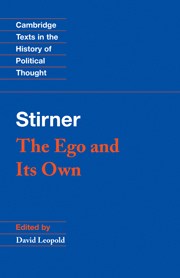Book contents
- Frontmatter
- Contents
- Acknowledgements
- Introduction
- Principal events in Stimer's life
- Further reading
- Note on the translation
- The Ego and Its Own
- First Part: MAN
- Second Part: I
- I Ownness
- II The owner
- III The unique one
- Biographical and other notes on the text
- Index of subjects
- Index of proper names
- Cambridge Texts in the History of Political Thought
I - Ownness
Published online by Cambridge University Press: 05 June 2012
- Frontmatter
- Contents
- Acknowledgements
- Introduction
- Principal events in Stimer's life
- Further reading
- Note on the translation
- The Ego and Its Own
- First Part: MAN
- Second Part: I
- I Ownness
- II The owner
- III The unique one
- Biographical and other notes on the text
- Index of subjects
- Index of proper names
- Cambridge Texts in the History of Political Thought
Summary
‘Does not the spirit thirst for freedom?’ – Alas, not my spirit alone, my body too thirsts for it hourly! When before the odorous castle-kitchen my nose tells my palate of the savoury dishes that are being prepared therein, it feels a fearful pining at its dry bread; when my eyes tell the hardened back about soft down on which one may lie more delightfully than on its compressed straw, a suppressed rage seizes it; when – but let us not follow the pains further. – And you call that a longing for freedom? What do you want to become free from, then? From your hardtack and your straw bed? Then throw them away! – But that seems not to serve you: you want rather to have the freedom to enjoy delicious foods and downy beds. Are men to give you this ‘freedom’ – are they to permit it to you? You do not hope that from their philanthropy, because you know they all think like – you: each is the nearest to himself! How, therefore, do you mean to come to the enjoyment of those foods and beds? Evidently not otherwise than in making them your property!
If you think it over rightly, you do not want the freedom to have all these fine things, for with this freedom you still do not have them; you want really to have them, to call them yours and possess them as your property.
- Type
- Chapter
- Information
- Stirner: The Ego and its Own , pp. 141 - 154Publisher: Cambridge University PressPrint publication year: 1995



